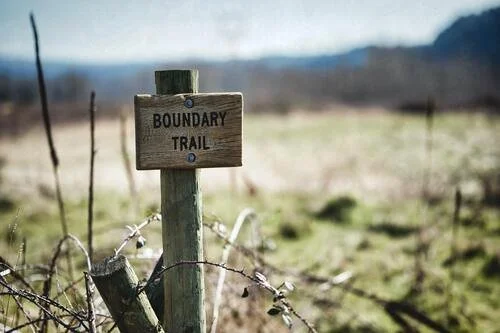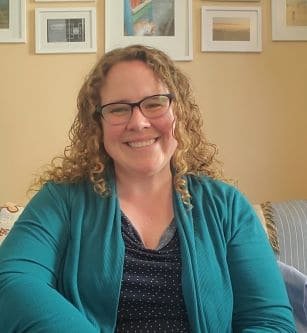Setting Boundaries with Toxic Parents
Have you ever had that thought of, “I wish my mom didn’t treat me that way?” or ,”I always feel worse after talking to my parents?”
Perhaps you’ve had the thought, “my parents gave me so much growing up, I shouldn’t hate it when they say/do/expect that of me?”
If you’ve grown up with a family where you feel disrespected, unseen or manipulated, you’re not alone. If you’re starting to recognize that some of the patterns in your family have been toxic for you, it’s OK to start looking at ways of taking care of and prioritizing your own emotional and mental health.
Taking care of yourself when you grew up in a difficult family often includes taking the steps of setting boundaries with toxic parents. It’s not uncommon for this to feel hard, for feelings of guilt to arise, to question if it’s the right choice. These feelings can be exacerbated by parents who get defensive, or ask for an explanation for the boundary, and then dismiss your reasoning.
It’s still important to take those steps. I believe that you can do hard things. If you’re reading this right now, I’m guessing that you grew up in a challenging family. The fact that you have survived that, and that you’re even considering moving differently in that family dynamic is a testament to your resilience and ability to do hard things.
And I’m sorry you’ve had to be so strong.
Do I need to know how to set boundaries with toxic parents?
Are my parents toxic?
OK, so I’ll confess that I don’t really love the word toxic, but I’m using it here to generally mean: consistently unhealthy for you. When I think of parents who are toxic, I think of disrespecting boundaries; being unable to listen to your feedback and adjust in a healthy way; being emotionally distant or the opposite, feeling too emotionally close for you; emotional abuse and/or neglect; physical abuse.
Some questions you might ask yourself are: do I feel exhausted after interacting with my parents? Do I feel they respect my needs? Do I resent how they treat me? Do I interact with my parents because I genuinely want to, or is it because I feel obligated to?
As with anything in life, some of these things can exist on a spectrum. Looking at your relationship with your parents and determining if they are toxic is up to you to decide. You get to determine what you are OK with in relationships. That includes setting boundaries that honor you.
How to set boundaries with toxic parents
Yeah, I think I need to set boundaries. I don’t even know where to start!
The first steps for setting boundaries with toxic parents are figuring out what your boundaries are. This may feel challenging, especially if you grew up in a family where boundaries weren’t respected.
Start checking in with yourself about times when you’ve felt exhausted or resentful around family interactions. Have there been interactions that felt good? What made the difference for you?
It’s also worth remembering that boundaries can change over time. You may start with a certain boundary, and realize it’s not working. It’s OK to change them if you need to.
You can also decide if fluid boundaries (where there is room for shifting dependent on the experience) or firm (defined structure that doesn’t shift) works best for you.
Some areas where you might want to set boundaries are: unexpected visits, prying into your life, snooping into your things, pushing you to share more than you want to, oversharing themselves. This list is not exhaustive, but might give you some jumping off points.
The next step for setting boundaries with toxic parents
Got it. I have a better sense about what’s right for me. Now what?
The next steps for setting boundaries with toxic parents are communicating clearly what the boundary is, and how you plan to reinforce them.
I wish people were mind readers so you could skip this step, but alas, they are not. It’s important to tell people clearly what your boundaries are.
Can this feel hard? Absolutely. Especially when you expect pushback or to be dismissed. It’s normal for this to feel challenging. Here’s the thing: the more you practice doing it, the more you trust that you can do it.
So what does this communication look like?
As an example, if you don’t want unexpected visits from your parents, you can state, “I need you to call before you visit.” This also means that you have to reinforce that boundary, as hard as that feels. If they show up on your doorstep without calling, you can decide not to let them into your home. Similarly, if you are on the phone, and feel your parents oversharing, you can state, “mom, I don’t want to listen to this. If you keep talking about this, I’m going to end this conversation.”
The repercussions are an important piece. If you’re here reading this, I’m guessing you have parents who may dismiss or disregard when you set boundaries. And if they can get away with it, why would they stop? Part of setting boundaries with toxic parents is committing to following through for yourself.
A note about setting boundaries with parents and guilt
But I feel really guilty setting these boundaries…
Yup, I hear you. Honestly, I’ve had to grapple with feeling guilty about setting boundaries in my own life.
Our society tells us that family should be a first priority.
You know that quote, “blood is thicker than water”? That’s a great example of a saying that’s used to leave us with the message that family ties are the most important. What if I told you that the full quote is actually, “the blood of the covenant is thicker than the water of the womb,” which is actually saying the exact opposite?
Societal expectations might come hand in hand with your parents stating that your boundaries are hurting them, or that your boundaries aren’t important. You may be hearing things like, “how could you say that to your father?” or “after all that we’ve done for you?”
With these societal messages and family narratives, of course that can lead to feeling guilty about setting boundaries with your parents,
I’m going to go against the grain of society here and tell you that you don’t actually owe it to your parents to sacrifice your health and well being for their wishes and desires. That can be hard to trust, especially if your cultural background has a narrative that says otherwise.
Taking steps in setting boundaries can feel hard, scary, anxiety provoking, and yes, can bring up feelings of guilt. I want to remind you:
You are allowed to take steps to take care of yourself.
In fact, it’s vital that you do.
That guilt you feel around setting boundaries? It may not even be your own guilt to carry.
Is that feeling real? Yes. To quote many a therapist and mental health program, feelings aren’t facts.
It’s worth asking yourself how that guilt is serving you, and if it is, how? Is there room to step back from that guilt? And if you need to reframe it, while you may have someone telling you that setting boundaries is hurting them, more often than not, setting boundaries is a step we take in an attempt to save the relationship.
Final thoughts around setting boundaries with toxic parents
OK, I hear you, but setting boundaries with toxic parents sounds hard! Do you think I can actually do it?
If you’re spending your time online looking up how to set boundaries with toxic parents, I get it. You’re looking for help and support because setting boundaries with toxic parents is hard. It’s not unusual to find yourself feeling guilty setting boundaries with parents.
I wish I had a beautifully simple way to fix your family dynamics. This is difficult work, and I commend you for even considering it, let alone taking some steps to do it.
Setting boundaries with toxic parents will probably take practice. Have compassion for yourself along your journey. I know I have compassion for you. I also know that starting to set boundaries for yourself can help you feel less resentful, less exhausted, and more able to put energy towards things that are important for you.
Kate O’Brien, LCAT
Kate is a licensed therapist in New York. She works with people who grew up in challenging families, who have experienced emotional trauma or neglect, who experience self-abandonment and people pleasing, and grief. Learn more here or schedule a consult call here if interested in working with her.




